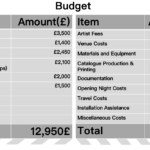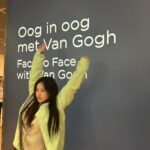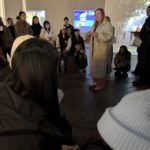Sarah, your blog reads like a passionate manifesto—one that sharply critiques traditional curation while earnestly exploring the possibilities of community-driven art. Your proposed project, Stick With It, which builds dialogue through postal art and craft, makes me want to participate immediately—a testament to the emotional resonance of your vision. As a peer, however, I’d like to share some points where I felt “stuck,” which might help ground your ideas further.
Your critique of the university’s archival exhibition (#004) is incisive: How do glass cases and rigid narratives stifle the conversations art should provoke? This resonated deeply. By centering joy as a curatorial driver (#006) and drawing on Corbett’s Gentle Protest (#009), you argue that art should not be an elitist endeavor but a means for ordinary people to express themselves through everyday materials (tickets, trinkets). This decentralized approach, rooted in feminist postal art history, carries real power. The handcrafted, collaged slides you designed (#012) aren’t just aesthetic choices—they embody the project’s ethos. This consistency is remarkable.
Your project harbors a core tension: It seeks to transcend physical spaces (e.g., critiquing galleries) yet relies heavily on tactile creation and in-person events (village halls, workshops). But practical barriers—postal system inefficiencies, material costs, participants’ time—are glossed over. For instance, in #006, you briefly mention digital platforms for sharing “digital trinkets” (photos, receipts) but default to favoring physical creation. Yet if accessibility is a goal, digital tools could engage marginalized groups (e.g., disabled or remote communities). By sidestepping this, does the project risk replicating the exclusivity of traditional art?
Another tension lies in the romanticization of collective labor. While #005 cites Sandra Teitge’s acceptance of “uneven workloads” in collectives, your goal of “equal pressure-sharing” raises questions: How do you reconcile individual limitations with collective goals? Corbett’s workshops succeed by partnering with established groups like the Women’s Institute—but building a network from scratch demands pragmatic strategies.
Recommendations: Grounding Utopia
- Run a small-scale pilot: Test a “postal art chain” among friends first. Document challenges—postal delays, material costs, participant dropouts—to gather actionable insights.
- Embrace hybridity: Use Instagram hashtags to collect digital creations, then curate physical exhibits from submissions. Explore AR tools to link physical mail to digital messages, bridging the analog-digital divide (#010).
- Confront systemic politics: Connect to real-world struggles, like the 2023 Royal Mail strikes. Invite participants to mail postcards advocating for public postal services—blending personal narratives with collective action.
- Sharpen theoretical edges: Apply Derrida’s Archive Fever to critique the university’s “net-zero” archival narrative (#004). How might your postal network become a “counter-archive”—fragmented, decentralized, and open to contradictions?
Final Note: Guard Against Becoming Another Authority
You critique “top-down curation” (e.g., in #014’s review of Yuman Ma), but your project risks imposing its own rules (e.g., “must use handmade materials”). Consider allowing participants to break rules—sending blank letters or digital files—and let this “chaos” fuel dialogue.
Stick With It deserves to evolve beyond a polished proposal. Lean into friction, and let the project grow through experimentation.
References:
Corbett, Sarah (Sarah P.). How to Be a Craftivist : The Art of Gentle Protest. London: Unbound, 2017.
Royal Mail Owner IDS Hurt by Lower Volumes, Strikes; Jet2 PLC to Beat FY 2023 Profit Forecasts. Dow Jones Institutional News. New York: Dow Jones & Company Inc, 2023.
Derrida, Jacques, and Eric Prenowitz. “Archive Fever: A Freudian Impression.” Diacritics 25, no. 2 (1995): 9–63. https://doi.org/10.2307/465144.
Hughes, Jenny, and Shannon Jackson. “Social Works: Performing Art, Supporting Publics.” New Theatre Quarterly. Cambridge: Cambridge University Press, 2012. https://doi.org/10.1017/S0266464X12000346.
Case study: https://joolsgilson.com/portfolio/the-knitting-map-2005-21/
Podcast: https://livethreesixty.podbean.com/e/the_liberating_power_of_gentle_activism-with-sarah-p-corbett/
Website: https://www.glasgowzinelibrary.com/








